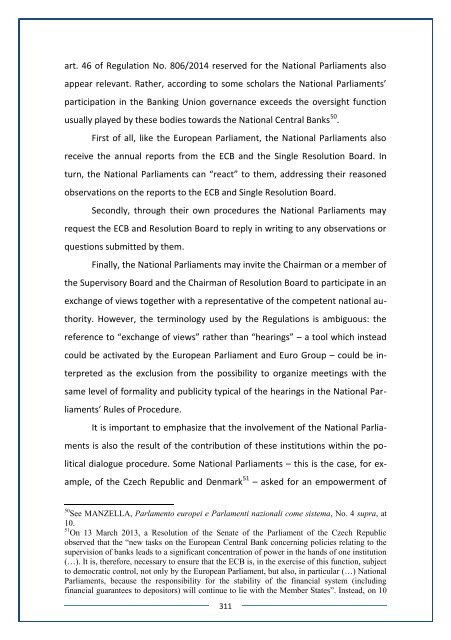ECONOMICS YEARLY REVIEW
Law_and_Economics_Yearly_Review_LEYR_Journal_vol_4_part_2_2015
Law_and_Economics_Yearly_Review_LEYR_Journal_vol_4_part_2_2015
You also want an ePaper? Increase the reach of your titles
YUMPU automatically turns print PDFs into web optimized ePapers that Google loves.
art. 46 of Regulation No. 806/2014 reserved for the National Parliaments also<br />
appear relevant. Rather, according to some scholars the National Parliaments’<br />
participation in the Banking Union governance exceeds the oversight function<br />
usually played by these bodies towards the National Central Banks 50 .<br />
First of all, like the European Parliament, the National Parliaments also<br />
receive the annual reports from the ECB and the Single Resolution Board. In<br />
turn, the National Parliaments can “react” to them, addressing their reasoned<br />
observations on the reports to the ECB and Single Resolution Board.<br />
Secondly, through their own procedures the National Parliaments may<br />
request the ECB and Resolution Board to reply in writing to any observations or<br />
questions submitted by them.<br />
Finally, the National Parliaments may invite the Chairman or a member of<br />
the Supervisory Board and the Chairman of Resolution Board to participate in an<br />
exchange of views together with a representative of the competent national authority.<br />
However, the terminology used by the Regulations is ambiguous: the<br />
reference to “exchange of views” rather than “hearings” – a tool which instead<br />
could be activated by the European Parliament and Euro Group – could be interpreted<br />
as the exclusion from the possibility to organize meetings with the<br />
same level of formality and publicity typical of the hearings in the National Parliaments’<br />
Rules of Procedure.<br />
It is important to emphasize that the involvement of the National Parliaments<br />
is also the result of the contribution of these institutions within the political<br />
dialogue procedure. Some National Parliaments – this is the case, for example,<br />
of the Czech Republic and Denmark 51 – asked for an empowerment of<br />
50 See MANZELLA, Parlamento europei e Parlamenti nazionali come sistema, No. 4 supra, at<br />
10.<br />
51 On 13 March 2013, a Resolution of the Senate of the Parliament of the Czech Republic<br />
observed that the “new tasks on the European Central Bank concerning policies relating to the<br />
supervision of banks leads to a significant concentration of power in the hands of one institution<br />
(…). It is, therefore, necessary to ensure that the ECB is, in the exercise of this function, subject<br />
to democratic control, not only by the European Parliament, but also, in particular (…) National<br />
Parliaments, because the responsibility for the stability of the financial system (including<br />
financial guarantees to depositors) will continue to lie with the Member States”. Instead, on 10<br />
311


